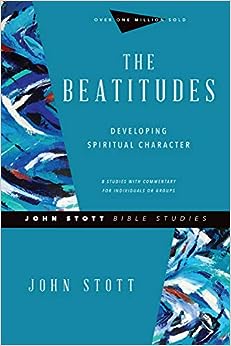Tonight we will be discussing the third Beatitude: Blessed are the Meek, For They shall Inherit the Land. Matthew 5:5. Please read through and answer the questions in chapter three of John Stott’s The Beatitudes – Developing Spiritual Character. Stott’s questions will guide our discussions tonight.
I have attached the commentaries on this Beatitude from Kenneth Bailey’s Jesus Through Middle Eastern Eyes and St. Gregory of Nyssa’s Sermons. These two men represent two of the great contrasting schools of biblical interpretation that have existed since the foundation of the church. Bailey gives us a very literal understanding of this third beatitude. Bailey tells us that the “land” is the physical land of Israel promised by God to Abraham. (p.72) And the “meek” are the humble and poor peasants to whom this geographic place would be given, not the powerful rulers of Rome nor even the violent rebels of the Zealots. For Bailey, to truly understand this teaching, we must first understand it in a very literal manner. This emphasis on the literal meaning of Scripture is a hallmark of the Jewish and Aramaic church which was traditionally based in the Syrian city of Antioch. Bailey’s Christianity is rooted in Arabic Christianity (Arabic being a Semitic language like Hebrew and Aramaic) which continues to emphasize the literal.
The other great traditional Christian school of interpretation arose in Alexandria, Egypt under the influence of Greek philosophy. This school emphasizes the allegorical understanding of the Scriptures. For them, to remain in the literal, is to remain in falsehood, and to truly obtain the Truth, we must have a higher spiritual understanding of the Scriptures than a simple literal meaning. After Origen of Alexandria, Gregory of Nyssa is the primary proponent of this view. In interpreting the word “land”, Gregory says that the land necessarily refers to Eden. For “He surely means the land that is fruitful in good things, where the Tree of Life waves its leaves, which is watered by the fountains of spiritual graces. It is the land where sprouts the True Vine, and its husbandman is the Father of the Lord.” (p.101) And the “meek” are not the poor peasants, but the person “not given over to passions, but steadied by reason” (p.103) and “not given over to anger but trained in humility.” (p.104). Therefore, in this Beatitude Christ promises that it is the humble and reasonable man who obtains reentry into the perfect spiritual state found in the Garden of Eden.
If you have the time today, read these two very different understandings of this Beatitude. To paraphrase a saying of Donnie McDaniel, the Scriptures are like a great jewel that is illuminated by the Light. As we look at the Scriptures from different points of view, the Light will be refracted differently. And therefore within these different interpretations, we have a more complete view of the underlying Light itself. These understandings aren’t oppositional but complementary to one another.
Dinner is at 6. The menu is bacon cheeseburgers. Discussion about 6:45. Hope to see you here and please bring a friend.
Be still before the Lord *
Psalm 37:7-12
and wait patiently for him.
Do not fret yourself over the one who prospers, *
the one who succeeds in evil schemes.
Refrain from anger, leave rage alone; *
do not fret yourself; it leads only to evil.
For evildoers shall be cut off, *
but those who wait upon the Lord shall possess the land.
In a little while the wicked shall be no more; *
you shall search out their place, but they will not be there.
But the lowly shall possess the land; *
they will delight in abundance of peace.

